Children giggle as young people flash their smartphones to film robots carrying plates of freshly prepared meals on their inbuilt trays to deliver to diners in a busy eatery in Kenya’s capital.
Nairobi has a vibrant tech industry with various startups and innovations in operation and has positioned itself as a tech hub in the East African region bearing the nickname The Silicone Savanna.
This is the Robot Cafe, believed to be the first of its kind in Nairobi and East Africa, where three robots glide among human waiters serving food to mesmerized customers.
These preprogrammed robots were acquired for entertainment. Cafe owner Mohammed Abbas says he experienced robot service in Asian and European countries and decided to invest in them.
“It was very expensive to import the robots,” he says, but adds that the investment has borne fruit, because the restaurant is “often busy with curious customers” who come to experience robot service.
One customer, Packson Chege, picks up a plate of fries from the robot tray as his friend films the experience across the table.
“I can say it is something unique because here in our country Kenya, I have never seen a restaurant like this one so I think for me, it is a good idea from the owner of this restaurant,” he said.

The three robots, which are named Claire, R24 and Nadia, aren’t programmed to have a full conversation with customers, but they can say “Your order is ready, Welcome” and then people have to press an exit button after picking up their food from the tray.
They are commanded by waiters through an application on an iPad.
Human waiters are still important in the operations of the cafe, because they take orders from customers who don’t use the online ordering option. The waiters then place the food on the robot tray when it’s ready and deliver drinks in person.
The technology is predicted to disrupt the future workforce globally, and especially in Africa, where there is a youthful population with a median age of 19 years.
But the cafe’s manager says the robots aren’t a replacement for human waiters as they can’t offer all services.
-

Robotic waiters serve customers at Robot Cafe in Nairobi, Kenya Thursday, Aug. 29, 2024. Robot Café, is first of a kind in Nairobi and East Africa, where three robots glide among human waiters serving food to mesmerized customers. Credit: AP Photo/Brian Inganga
-
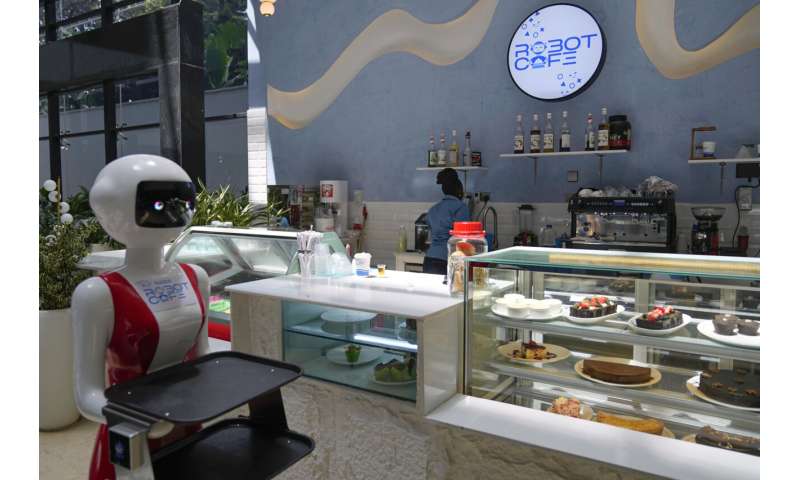
Robotic waiter stands beside the counter, at Robot Cafe in Nairobi, Kenya Thursday, Aug. 29, 2024. The three robots, christened Claire, R24 and Nadia, are not programmed to have a full conversation with customers, but they can say “Your order is ready, Welcome” then people have to press an exit button after picking up their food from the tray. Credit: AP Photo/Brian Inganga
-

Robotic waiter Claire, delivers an order to customers at the Robot Cafe in Nairobi, Kenya Thursday, Aug. 29, 2024. The three robots, christened Claire, R24 and Nadia, are not programmed to have a full conversation with customers, but they can say “Your order is ready, Welcome” then people have to press an exit button after picking up their food from the tray. Credit: AP Photo/Brian Inganga
-

Robotic waiter Claire, delivers an order to customers at the Robot Cafe in Nairobi, Kenya Thursday, Aug. 29, 2024. The three robots, christened Claire, R24 and Nadia, are not programmed to have a full conversation with customers, but they can say “Your order is ready, Welcome” then people have to press an exit button after picking up their food from the tray. Credit: AP Photo/Brian Inganga
-
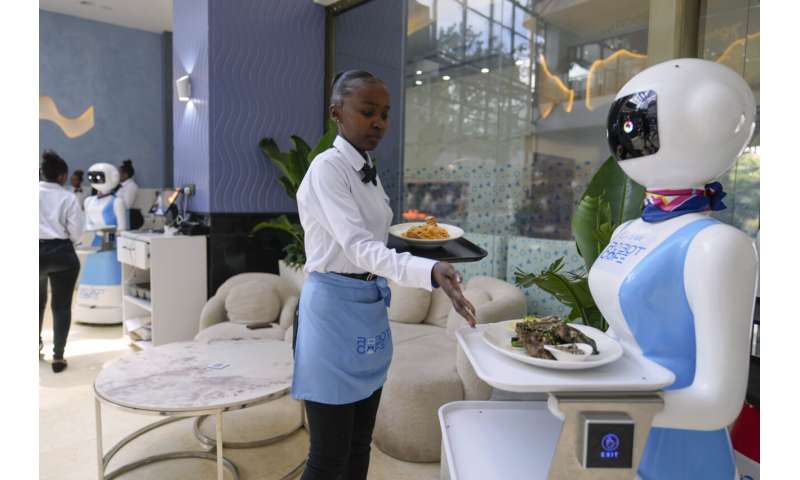
Robotic waiter Claire, receives an order from a human waiter to deliver to customers at the Robot Cafe in Nairobi, Kenya Thursday, Aug. 29, 2024. The three robots, christened Claire, R24 and Nadia, are not programmed to have a full conversation with customers, but they can say “Your order is ready, Welcome” then people have to press an exit button after picking up their food from the tray. Credit: AP Photo/Brian Inganga
-
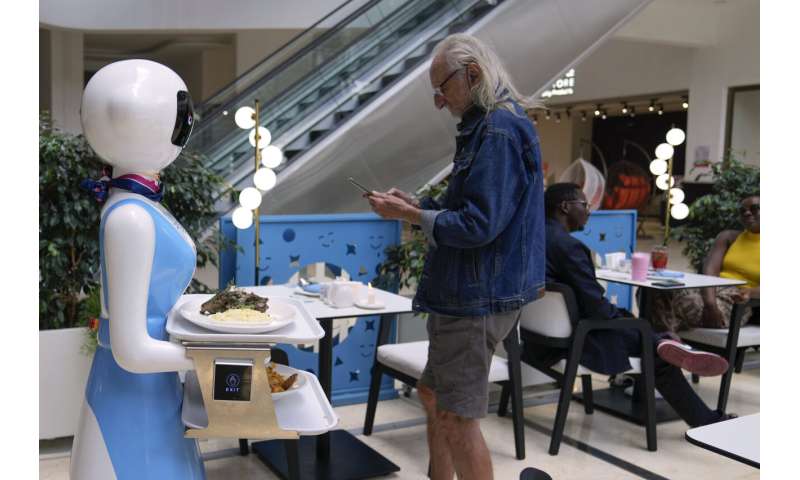
Robotic waiter Claire, delivers an order to customers at the Robot Cafe in Nairobi, Kenya Thursday, Aug. 29, 2024. The three robots, christened Claire, R24 and Nadia, are not programmed to have a full conversation with customers, but they can say “Your order is ready, Welcome” then people have to press an exit button after picking up their food from the tray. Credit: AP Photo/Brian Inganga
-
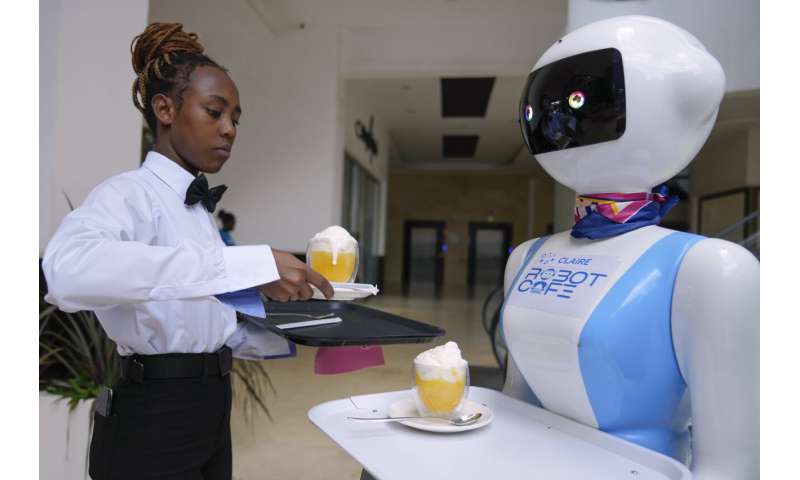
Robotic waiter Claire, receives an order from a human waiter to deliver to customers at the Robot Cafe in Nairobi, Kenya Thursday, Aug. 29, 2024. The three robots, christened Claire, R24 and Nadia, are not programmed to have a full conversation with customers, but they can say “Your order is ready, Welcome” then people have to press an exit button after picking up their food from the tray. Credit: AP Photo/Brian Inganga
-
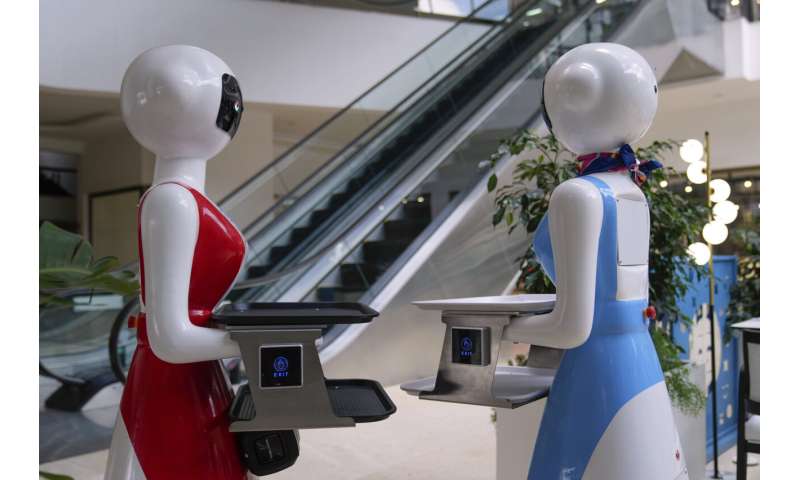
Robotic waiters stand at the Robot Cafe in Nairobi, Kenya Thursday, Aug. 29, 2024. The three robots, christened Claire, R24 and Nadia, are not programmed to have a full conversation with customers, but they can say “Your order is ready, Welcome” then people have to press an exit button after picking up their food from the tray. Credit: AP Photo/Brian Inganga
-

Robotic waiter serves customers at a Robot Cafe in Nairobi, Kenya Thursday, Aug. 29, 2024. The three robots, christened Claire, R24 and Nadia, are not programmed to have a full conversation with customers, but they can say “Your order is ready, Welcome” then people have to press an exit button after picking up their food from the tray. Credit: AP Photo/Brian Inganga
“At no point are the robots able to fully function in all the services that are supposed to be ongoing in the restaurant without the human touch,” John Kariuki said. “The robots are actually way too expensive for us to acquire, so if you are trying to save money, it is not going to work if you choose to go the robotic way.”
A hospitality industry expert, Edith Ojwang, said that there’s room for robotic and human service to coexist in the industry.
“The hospitality industry is very diverse. We have clients who will prefer robotic service and full automation, while we also have clients who will prefer human service, the human touch and warmth that comes with human service so it is not entirely a threat to human labor because of the diverse nature of the hospitality client base,” she said.
© 2024 The Associated Press. All rights reserved. This material may not be published, broadcast, rewritten or redistributed without permission.
Citation:
Robot waiters in Kenya create a buzz. But there are concerns about what it means for human labor (2024, September 1)
retrieved 1 September 2024
from https://techxplore.com/news/2024-09-robot-waiters-kenya-human-labor.html
This document is subject to copyright. Apart from any fair dealing for the purpose of private study or research, no
part may be reproduced without the written permission. The content is provided for information purposes only.





